Thuy Dung Nguyen
FedGrad: Mitigating Backdoor Attacks in Federated Learning Through Local Ultimate Gradients Inspection
Apr 29, 2023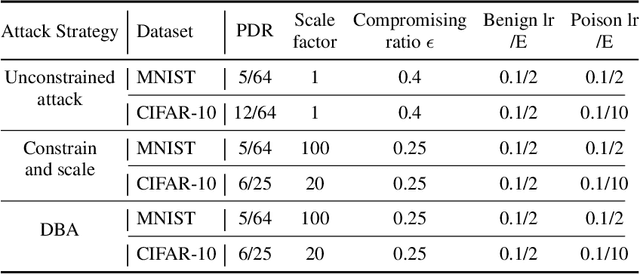

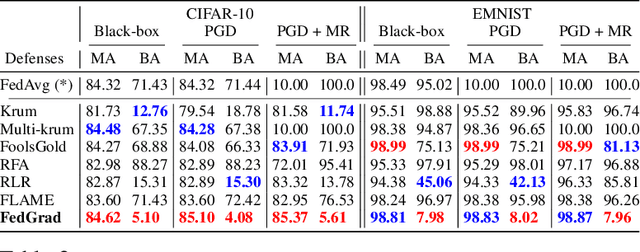
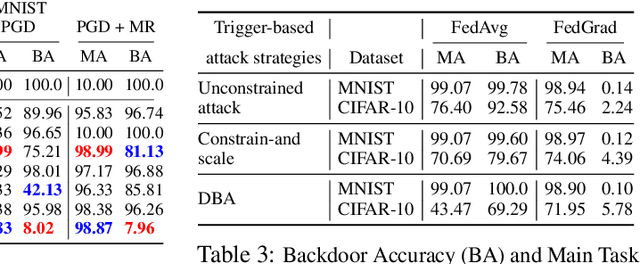
Abstract:Federated learning (FL) enables multiple clients to train a model without compromising sensitive data. The decentralized nature of FL makes it susceptible to adversarial attacks, especially backdoor insertion during training. Recently, the edge-case backdoor attack employing the tail of the data distribution has been proposed as a powerful one, raising questions about the shortfall in current defenses' robustness guarantees. Specifically, most existing defenses cannot eliminate edge-case backdoor attacks or suffer from a trade-off between backdoor-defending effectiveness and overall performance on the primary task. To tackle this challenge, we propose FedGrad, a novel backdoor-resistant defense for FL that is resistant to cutting-edge backdoor attacks, including the edge-case attack, and performs effectively under heterogeneous client data and a large number of compromised clients. FedGrad is designed as a two-layer filtering mechanism that thoroughly analyzes the ultimate layer's gradient to identify suspicious local updates and remove them from the aggregation process. We evaluate FedGrad under different attack scenarios and show that it significantly outperforms state-of-the-art defense mechanisms. Notably, FedGrad can almost 100% correctly detect the malicious participants, thus providing a significant reduction in the backdoor effect (e.g., backdoor accuracy is less than 8%) while not reducing the main accuracy on the primary task.
Backdoor Attacks and Defenses in Federated Learning: Survey, Challenges and Future Research Directions
Mar 03, 2023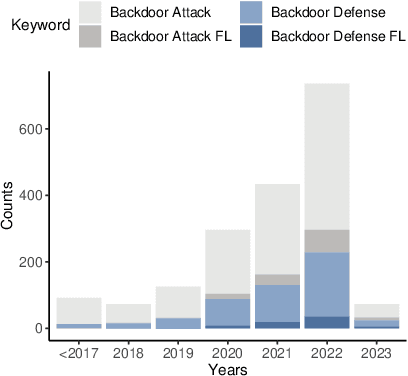
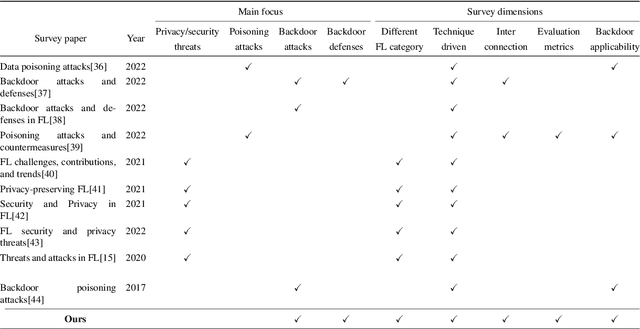
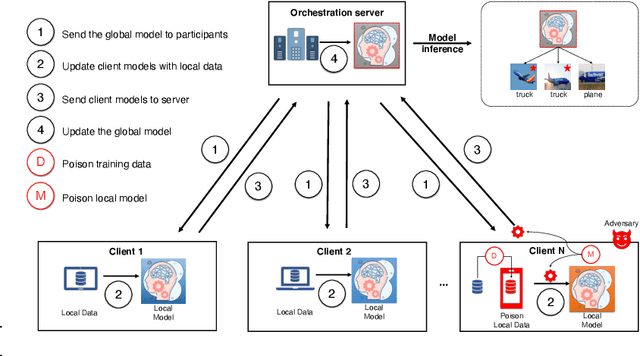
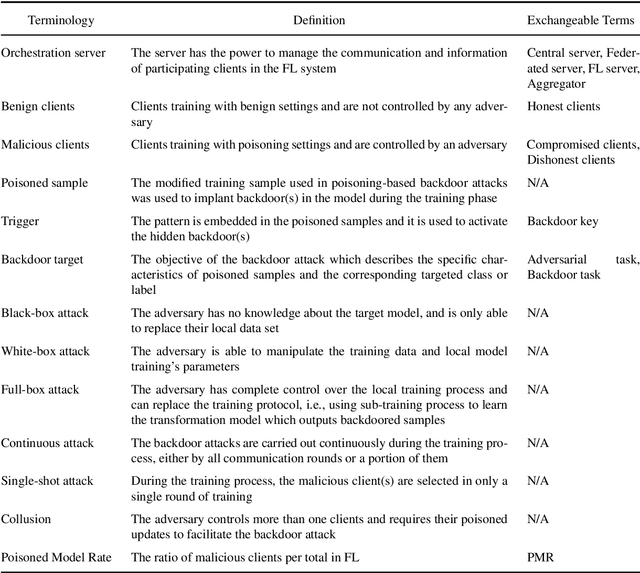
Abstract:Federated learning (FL) is a machine learning (ML) approach that allows the use of distributed data without compromising personal privacy. However, the heterogeneous distribution of data among clients in FL can make it difficult for the orchestration server to validate the integrity of local model updates, making FL vulnerable to various threats, including backdoor attacks. Backdoor attacks involve the insertion of malicious functionality into a targeted model through poisoned updates from malicious clients. These attacks can cause the global model to misbehave on specific inputs while appearing normal in other cases. Backdoor attacks have received significant attention in the literature due to their potential to impact real-world deep learning applications. However, they have not been thoroughly studied in the context of FL. In this survey, we provide a comprehensive survey of current backdoor attack strategies and defenses in FL, including a comprehensive analysis of different approaches. We also discuss the challenges and potential future directions for attacks and defenses in the context of FL.
Image-based Contextual Pill Recognition with Medical Knowledge Graph Assistance
Aug 09, 2022

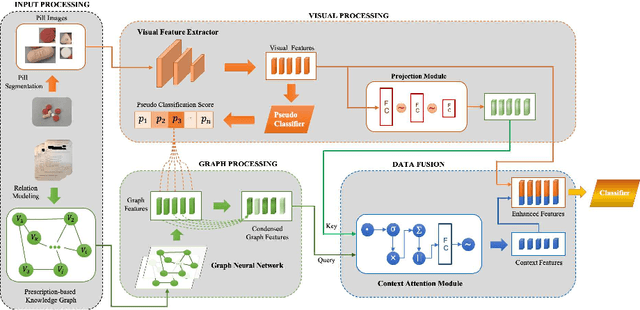
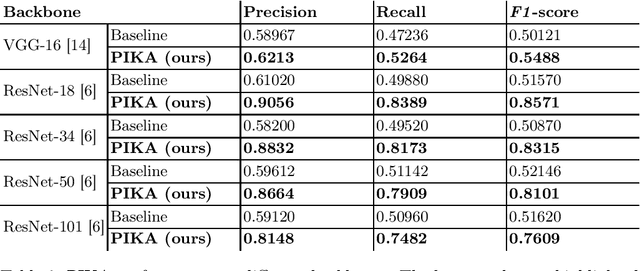
Abstract:Identifying pills given their captured images under various conditions and backgrounds has been becoming more and more essential. Several efforts have been devoted to utilizing the deep learning-based approach to tackle the pill recognition problem in the literature. However, due to the high similarity between pills' appearance, misrecognition often occurs, leaving pill recognition a challenge. To this end, in this paper, we introduce a novel approach named PIKA that leverages external knowledge to enhance pill recognition accuracy. Specifically, we address a practical scenario (which we call contextual pill recognition), aiming to identify pills in a picture of a patient's pill intake. Firstly, we propose a novel method for modeling the implicit association between pills in the presence of an external data source, in this case, prescriptions. Secondly, we present a walk-based graph embedding model that transforms from the graph space to vector space and extracts condensed relational features of the pills. Thirdly, a final framework is provided that leverages both image-based visual and graph-based relational features to accomplish the pill identification task. Within this framework, the visual representation of each pill is mapped to the graph embedding space, which is then used to execute attention over the graph representation, resulting in a semantically-rich context vector that aids in the final classification. To our knowledge, this is the first study to use external prescription data to establish associations between medicines and to classify them using this aiding information. The architecture of PIKA is lightweight and has the flexibility to incorporate into any recognition backbones. The experimental results show that by leveraging the external knowledge graph, PIKA can improve the recognition accuracy from 4.8% to 34.1% in terms of F1-score, compared to baselines.
FedDRL: Deep Reinforcement Learning-based Adaptive Aggregation for Non-IID Data in Federated Learning
Aug 04, 2022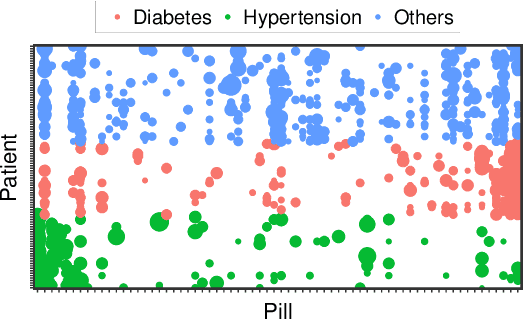
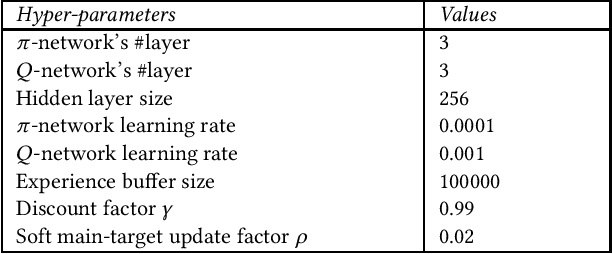
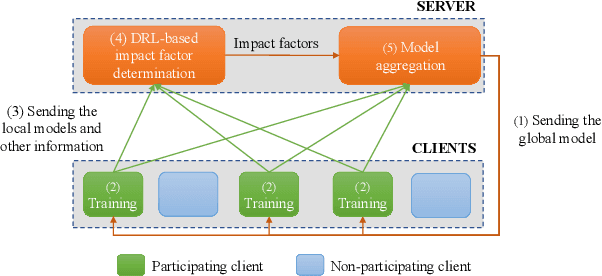

Abstract:The uneven distribution of local data across different edge devices (clients) results in slow model training and accuracy reduction in federated learning. Naive federated learning (FL) strategy and most alternative solutions attempted to achieve more fairness by weighted aggregating deep learning models across clients. This work introduces a novel non-IID type encountered in real-world datasets, namely cluster-skew, in which groups of clients have local data with similar distributions, causing the global model to converge to an over-fitted solution. To deal with non-IID data, particularly the cluster-skewed data, we propose FedDRL, a novel FL model that employs deep reinforcement learning to adaptively determine each client's impact factor (which will be used as the weights in the aggregation process). Extensive experiments on a suite of federated datasets confirm that the proposed FedDRL improves favorably against FedAvg and FedProx methods, e.g., up to 4.05% and 2.17% on average for the CIFAR-100 dataset, respectively.
 Add to Chrome
Add to Chrome Add to Firefox
Add to Firefox Add to Edge
Add to Edge